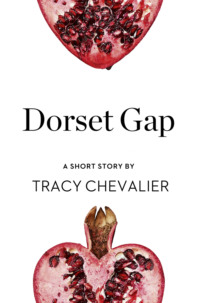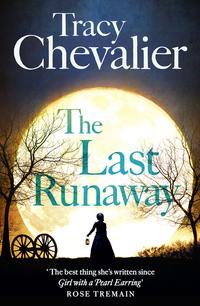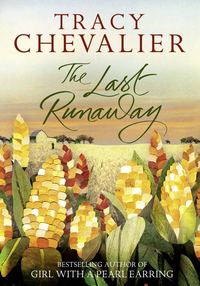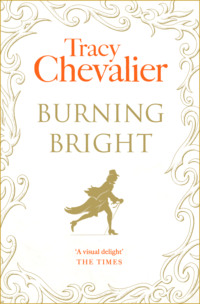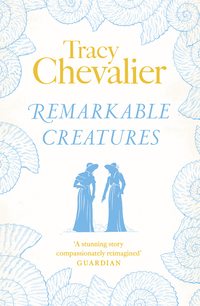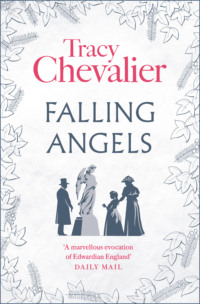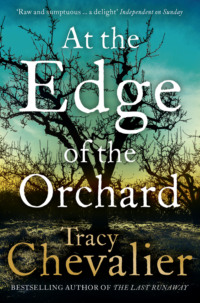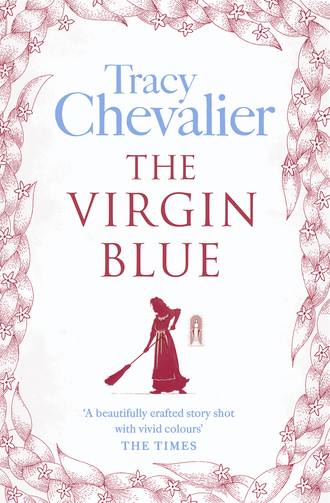
Полная версия
The Virgin Blue
—But they are the same, she said, puzzled. How can that be your name and my name both?
—You wrote it, so it is your name. You don’t know that? Whoever writes it, it is theirs.
—But—She stopped, and kept her mouth open, waiting for the marks to fly to her mouth. But when she spoke, it was his name that came out, not hers.
—Now you must pay, Etienne said, smiling. He pushed her over the boulder, stood behind her, and pulled her skirt up and his breeches down. He parted her legs with his knees and with his hand held her apart so that he could enter suddenly, with a quick thrust. Isabelle clung to the boulder as Etienne moved against her. Then with a shout he pushed her shoulders away, bending her forward so that her face and chest pressed hard against the rock.
After he withdrew she stood up shakily. The parchment had been pressed into her cheek and fluttered to the ground. Etienne looked at her face and grinned.
—You’ve written your name on your face, he said.
She had never been inside the Tourniers’ farm, though it was not far from her father’s, down along the river. It was the largest farm in the area apart from that of the Duc, who lived further down the valley, half a day’s walk towards Florac. It was said to have been built 100 years before, with additions over time: a pigsty, a threshing floor, a tiled roof to replace the thatch. Jean and his cousin Hannah had married late, had only three children, were careful, powerful, remote. Evening visits to their hearth were rare.
Despite their influence, Isabelle’s father had never been quiet about his scorn.
—They marry their cousins, Henri du Moulin scoffed. They give money to the church but they wouldn’t give a mouldy chestnut to a beggar. And they kiss three times, as if two were not enough.
The farm was spread along a slope in an L shape, the entrance in the crux, facing south. Etienne led her inside. His parents and two hired workers were planting in the fields; his sister, Susanne, was working at the bottom of the kitchen garden.
Inside it was quiet and still. All Isabelle could hear were the muted grunts of pigs. She admired the sty, the barn twice the size of her father’s. She stood in the common room, touching the long wooden table lightly with her fingertips as if to steady herself. The room was tidy, newly swept, pots hung at even intervals from hooks on the walls. The hearth took up a whole end of the room, so big all of her family and the Tourniers could stand in it together – all of her family before she began to lose them. Her sister, dead. Her mother, dead. Her brothers, soldiers. Just she and her father now.
—La Rousse.
She turned round, saw Etienne’s eyes, the swagger in his stride, and backed up until granite touched her back. He matched her step and put his hands on her hips.
—Not here, she said. Not in your parents’ house, on the hearth. If your mother—
Etienne dropped his hands. The mention of his mother was enough to tame him.
—Have you asked them?
He was silent. His broad shoulders sagged and he stared off into a corner.
—You have not asked them.
—I’ll be twenty-five soon and I can do what I want then. I won’t need their permission then.
Of course they don’t want us to marry, Isabelle thought. My family is poor, we have nothing, but they are rich, they have a Bible, a horse, they can write. They marry their cousins, they are friends with Monsieur Marcel. Jean Tournier is the Duc de l’Aigle’s syndic, collecting tax from us. They would never accept as their daughter a girl they call La Rousse.
—We could live with my father, she suggested. It has been hard for him without my brothers. He needs—
—Never.
—So we must live here.
—Yes.
—Without their consent.
Etienne shifted his weight from one leg to the other, leaned against the edge of the table, crossed his arms. He looked at her directly.
—If they don’t like you, he said softly, it’s your own fault, La Rousse.
Isabelle’s arms stiffened, her hands curled into fists.
—I have done nothing wrong! she cried. I believe in the Truth.
He smiled.
—But you love the Virgin, yes?
She bowed her head, fists still clenched.
—And your mother was a witch.
—What did you say? she whispered.
—That wolf that bit your mother, he was sent by the devil to bring her to him. And all those babies dying.
She glared at him.
—You think my mother made her own daughter die? Her own granddaughter die?
—When you are my wife, he said, you will not be a midwife. He took her hand and pulled her towards the barn, away from his parents’ hearth.
—Why do you want me? she asked in a low voice he could not hear. She answered herself: Because I am the one his mother hates most.
The kestrel hovered directly overhead, fluttering against the wind. Grey: male. Isabelle narrowed her eyes. No. Reddish-brown, the colour of her hair: female.
Alone she had learned to remain on the surface of the water, lying on her back, arms stroking out from her sides, breasts flattened, hair floating in the river like leaves around her face. She looked up again. The kestrel was diving to her right. The brief moment of impact was hidden by a clump of broom. When the bird reappeared it was carrying a tiny creature, a mouse or a sparrow. It flew up fast then and out of sight.
She sat up abruptly, crouching on the long smooth rock of the river bed, her breasts regaining their roundness. The sounds arose out of nothing, a tinkle here and there, then suddenly joined together into a chorus of hundreds of bells. The estiver – Isabelle’s father had predicted they would arrive in two days’ time. Their dogs must be good this summer. If she didn’t hurry she would be surrounded by hundreds of sheep. She stood up quickly and picked her way to the bank, where she brushed the water from her skin with the flat of her hand and wrung the river from her hair. Her shameful hair. She pulled on her dress and smock and wound her hair out of sight in a long piece of white linen.
She was tucking in the end of the linen when she froze, feeling eyes on her. She searched as much of the surrounding land as she could without moving her head but could see nothing. The bells were still far away. With her fingers she felt for loose strands of hair and pushed them under the cloth, then dropped her arms, pulled her dress up away from her feet, and began to run down the path next to the river. Soon she turned off it and crossed a field of scrubby broom and heather.
She reached the crest of a hill and looked down. Far below a field rippled with sheep making their way up the mountain. Two men, one in front, one at the back, and a dog on each side were keeping the flock together. Occasionally a few strays darted to one side, to be herded quickly back into the fold. They would have been walking for five days now, all the way from Alès, but at this final summit they showed no signs of flagging. They would have the whole summer to recover.
Over the bells she could hear the whistles and shouts of the men, the sharp barks of the dogs. The man in front looked up, straight at her it seemed, and whistled shrilly. Immediately a young man appeared from behind a boulder a stone’s throw to her right. Isabelle clutched her neck. He was small and wiry, sweaty and very dark from the sun. He carried a walking stick and the leather sack of a shepherd and wore a close-fitting round cap, black curls framing the brim. When she felt his dark eyes on her she knew he had seen her in the river. He smiled at her, friendly, knowing, and for a moment Isabelle felt the touch of the river on her body. She looked down, pressed her elbows to her breasts, could not smile back.
With a leap the man started down the hill. Isabelle watched his progress until he reached the flock. Then she fled.
—There is a child here. Isabelle placed a hand on her belly and stared defiantly at Etienne.
In an instant his pale eyes darkened like the shadow of a cloud crossing a field. He looked at her hard, calculating.
—I will tell my father, then we must tell your parents. She swallowed. What will they say?
—They’ll let us marry now. It would look worse if they said no when there is a child.
—They’ll think I did it deliberately.
—Did you? His eyes met hers. They were cold now.
—It was you who wanted the Sin, Etienne.
—Ah, but you wanted it too, La Rousse.
—I wish Maman were here, she said softly. I wish Marie were here.
Her father acted as if he had not heard her. He sat on the bench by the door and scraped at a branch with his knife; he was making a new pole for the hoe he had broken earlier that day. Isabelle stood motionless in front of him. She had said it so quietly that she began to think she would have to repeat herself. She opened her mouth to speak when he said:— You have all left me.
—I’m sorry, Papa. He says he won’t live here.
—I wouldn’t have a Tournier in my house. This farm won’t go to you when I die. You’ll get your dowry, but I will leave the farm to my nephews over at l’Hôpital. A Tournier will never get my land.
—The twins will return from the wars, she suggested, fighting tears.
—No. They will die. They’re not soldiers, but farmers. You know that. Two years and no word from them. Plenty have passed through from the north and no news.
Isabelle left her father sitting on the bench and walked across their fields, along the river, down to the Tournier farm. It was late, more dark than light, long shadows cast along the hills and the terraced fields full of half-grown rye. A flock of starlings sang in the trees. The route between the two farms seemed long now, at the end of it Etienne’s mother. Isabelle began walking more slowly.
She had reached the Tourniers’ empty cleda, the season’s chestnuts long since dried, when she saw the grey shadow emerge skittishly from the trees to stand in the path.
—Sainte Vierge, aide-moi, she prayed automatically. She watched the wolf watching her, its yellow eyes bright despite the gloom. When it began to move towards her, Isabelle heard a voice in her head:— Don’t let this happen to you too.
She crouched and picked up a large branch. The wolf stopped. She stood up and advanced, waving the stick and shouting. The wolf began to move backwards, and when Isabelle pretended to throw the branch, it turned and skittered sideways, disappearing into the trees.
Isabelle ran from the woods and across a field, rye cutting into her calves. She reached the rock shaped like a mushroom that marked the bottom of the Tourniers’ kitchen garden and stopped to catch her breath. Her fear of Etienne’s mother was gone.
—Thank you, Maman, she said softly. I won’t forget.
Jean, Hannah and Etienne were sitting by the fire while Susanne cleared the last of their bajanas, the same chestnut soup Isabelle had served her father earlier, and dark, sweet-smelling bread. All four froze when Isabelle entered.
—What is it, La Rousse? Jean Tournier asked as she stood in the middle of the room, her hand once more resting on the table as if to secure her a place among them.
Isabelle said nothing but looked steadily at Etienne. At last he stood up and moved to her side. She nodded and he turned to face his parents.
The room was silent. Hannah’s face looked like granite.
—Isabelle is going to have a child, Etienne said in a low voice. With your permission we would like to marry.
It was the first time he had ever used Isabelle’s name.
Hannah’s voice pierced.
—You carry whose child, La Rousse? Not Etienne’s.
—It is Etienne’s child.
—No!
Jean Tournier put his hands on the table and stood up. His silver hair was smooth like a cap against his skull, his face gaunt. He said nothing, but his wife stopped speaking and sat back. He looked at Etienne. There was a long pause before Etienne spoke.
—It is my child. We will marry anyway when I am twenty-five. Soon.
Jean and Hannah exchanged glances.
—What does your father say? Jean asked Isabelle.
—He has given his permission and will provide the dowry. She said nothing about his hatred.
—Go and wait outside, La Rousse, Jean said quietly. You go with her, Susanne.
The girls sat side by side on the door bench. They had seen little of each other since they were children. Many years ago, even before Isabelle’s hair turned red, Susanne had played with Marie, helping with the haying, the goats, splashing in the river.
For a while they sat, looking out over the valley.
—I saw a wolf out by the cleda, Isabelle said suddenly.
Susanne stared, brown eyes wide. She had the thin face and pointed chin of her father.
—What did you do?
—Chased it with a stick. She smiled, pleased with herself.
—Isabelle—
—What is it?
—I know Maman is upset, but I am glad you will live with us. I never believed what they said about you, about your hair and— She stopped. Isabelle did not ask.
—And you will be safe here. This house is safe, protected by—
She stopped again, glanced at the door, bowed her head. Isabelle let her eyes rest on the shadowy humps of the hills in the distance.
It will always be like this, she thought. Silence in this house.
The door opened and Jean and Etienne emerged with a flickering torch and an axe.
—We will take you back, La Rousse, Jean said. I must speak with your father.
He handed a piece of bread to Etienne.
—Take this bread together and give her your hand.
Etienne tore the bread in two and gave the smaller piece to Isabelle. She put it in her mouth and placed her hand in his. His fingers were cold. The bread stuck in the back of her throat like a whisper.
Petit Jean was born in blood and was a fearless child.
Jacob was born blue. He was a quiet child: even when Hannah smacked his back to start his breath he did not scream.
Isabelle lay in the river again, many summers later. There were marks on her body from the two boys, and another child pushing her belly above the water. The baby kicked. She cupped the mound with her hands.
—Please let the Virgin make it a girl, she prayed. And when she is born I will name her after you, after my sister. Marie. I will fight everyone to name her that.
This time there were no warnings at all, no bells, no sense of eyes on her. He was just there, sitting on his heels on the river bank. She sat up and looked at him. She did not cover her breasts. He looked the same, a little older, with a long scar down the right side of his face, from his cheekbone to his chin, touching the corner of his mouth. This time she would have smiled back at him if he had smiled. The shepherd did not smile. He simply nodded at her, cupped his hands, splashed water on his face, then turned and walked in the direction of the river’s source.
Marie was born in a flood of clear liquid, her eyes open. She was a hopeful child.
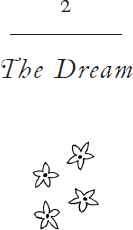
When Rick and I moved to France, I figured my life would change a little. I just didn’t know how.
To begin with, the new country was a banquet where we were ready to try every dish. Our first week there, while Rick was sharpening his pencils at his new office, I knocked the rust from my high-school French and set out to explore the countryside surrounding Toulouse and to find us a place to live. A small town was what we wanted; an interesting town. I sped along little roads in a new grey Renault, driving fast through long lines of sycamores. Occasionally when I wasn’t paying attention I thought I was in Ohio or Indiana, but the landscape snapped back into itself the moment I saw a house with a red tile roof, green shutters, window boxes full of geraniums. Everywhere farmers in bright blue work pants stood in fields dusted with pale April green and watched my car pass across their horizon. I smiled and waved; sometimes they waved back, hesitantly. ‘Who was that?’ they were probably asking themselves.
I saw a lot of towns and rejected them all, sometimes for frivolous reasons, but ultimately because I was looking for a place that would sing to me, that would tell me my search was over.
I arrived in Lisle-sur-Tarn by crossing a long narrow bridge over the River Tarn. At the end of it a church and a café marked the town’s edge. I parked next to the café and began to walk; by the time I reached the centre of town I knew we would live there. It was a bastide, a fortified town preserved from the Middle Ages; when there were invasions in medieval times the villagers would gather in the market square and close off its four entrances. I stood in the middle of the square next to a fountain with lavender bushes planted around it and felt contained and content.
The square was surrounded on all four sides by an arched, covered walkway, with shops on the ground level and shuttered houses above. The arches were built of long narrow bricks; the same bricks made up the top two levels of the houses, laid horizontally or diagonally in decorative patterns between brown timbers, held together with dull pink mortar.
This is what I need, I thought. Seeing this every day will make me happy.
Immediately I began having doubts. It seemed absurd to decide on a town because of one beautiful square. I began to walk again, looking for that deciding factor, the sign that would make me stay or go.
It didn’t take long. After exploring the surrounding streets I entered a boulangerie on the square. The woman behind the counter was short and wore a navy blue and white housecoat I’d seen for sale at every market I had visited. When she finished with another customer she turned to me, black eyes scrutinizing me from a lined face, hair pulled back in a loose bun.
‘Bonjour, Madame,’ she said in the singsong intonation French women use in shops.
‘Bonjour,’ I replied, glancing at the bread on the shelves behind her and thinking: This will be my boulangerie now. But when I looked back at her, expecting a warm welcome, my confidence fell away. She stood solidly behind the counter, her face like armour.
I opened my mouth: nothing came out. I swallowed. She stared at me and said, ‘Oui, Madame?’ in exactly the same tone she’d first used, as if the last few awkward seconds hadn’t occurred.
I hesitated, then pointed at a baguette. ‘Un,’ I managed to say, though it sounded more like a grunt. The woman’s face modulated into the stiffness of disapproval. She reached behind her without looking, eyes still fixed on me.
‘Quelque chose d’autre, Madame?’
For a moment I stepped outside myself and saw myself as she must see me: foreign, transient, thick tongue stumbling over peculiar sounds, dependent on a map to locate me in a strange landscape and a phrasebook and dictionary to communicate. She made me feel lost the very moment I thought I’d found home.
I looked at the display, desperate to show her I wasn’t as ridiculous as I seemed. I pointed at some onion quiches and managed to say, ‘Et un quiche.’ A split second afterwards I knew I’d used the wrong article – quiche was feminine and should be used with une – and groaned inwardly.
She put one in a small bag and laid it on the counter next to the baguette. ‘Quelque chose d’autre, Madame?’ she repeated.
‘Non.’
She rang up the purchases on the cash register. Mutely I handed her the money, then realized when she placed my change on a small tray on the counter that I should have put the money there rather than directly into her hand. I frowned. It was a lesson I ought to have learned already.
‘Merci, Madame,’ she intoned with a blank face and flinty eyes.
‘Merci,’ I mumbled.
‘Au revoir, Madame.’
I turned to go, then stopped, thinking there must be a way to salvage this. I looked at her: she had crossed her arms over her vast bosom.
‘Je – nous – nous habitons près d’ici, là-bas,’ I lied, gesturing wildly behind me, clawing out a territory somewhere in her town.
She nodded once. ‘Oui, Madame. Au revoir, Madame.’
‘Au revoir, Madame,’ I replied, spinning around and out the door.
Oh Ella, I thought as I trudged across the square, what are you doing, lying to save face?
‘So don’t lie, then. Live here. Confront Madame every day over the croissants,’ I muttered in reply. I found myself by the fountain and reached over to a lavender bush, pulled off a few leaves and crushed them between my fingers. The sharp woody scent said: Reste.
Rick loved Lisle-sur-Tarn when he saw it, and made me feel better about my choice by kissing me and spinning me around in his arms. ‘Hah!’ he shouted at the old houses.
‘Shh, Rick,’ I said. It was market day in the square and I could feel all eyes on us. ‘Put me down,’ I hissed.
He just smiled and held me more tightly.
‘This is my kind of town,’ he said. ‘Just look at the detail in that brickwork!’
We wandered all over, picking out our favourite houses. Later we stopped at the boulangerie for more onion quiches. I turned red the moment Madame looked at me, but she directed most of her remarks at Rick, who found her hilarious and chuckled at her without appearing to offend her in the slightest. I could see she found him handsome: his blond ponytail in this land of short dark hair was a novelty and his Californian tan hadn’t faded yet. To me she was polite, but I detected an underlying hostility that made me tense.
‘It’s a shame those quiches are so good,’ I remarked to Rick out on the street. ‘Otherwise I’d never go in there again.’
‘Oh babe, there you go, taking things to heart. Don’t go all East-coast paranoid on me, now.’
‘She just makes me feel unwelcome.’
‘Bad customer relations. Tut-tut! Better get a personnel consultant in to sort her out.’
I grinned at him. ‘Yeah, I’d like to see her file.’
‘Positively riddled with complaints. She’s on her last legs, it’s obvious. Have a little pity on the old thing.’
It was tempting to live in one of the old houses in or near the square, but when we found out none were for rent I was secretly relieved: they were serious houses, for established members of town. Instead we found a place a few minutes’ walk from the centre, still old but without the fancy brickwork, with thick walls and tiled floors and a small back patio sheltered by a vine-covered trellis. There was no front yard: the front door opened directly onto the narrow street. The house was dark inside, though Rick reminded me that it would be cool during the summer. All of the houses we’d seen were like that. I fought against the dimness by keeping the shutters open, and caught my neighbours peeking through the windows several times before they learned not to look.
One day I decided to surprise Rick: when he came home from work that night I’d painted over the dull brown of the shutters with a rich burgundy and hung boxes of geraniums from the windows. He stood in front of the house smiling up at me as I leaned over the window sill, framed in pink and white and red blossoms.
‘Welcome to France,’ I said. ‘Welcome home.’
When my father found out Rick and I were going to live in France he encouraged me to write to a cousin several times removed who lived in Moutier, a small town in northwest Switzerland. Dad had visited Moutier once, long ago. ‘You’ll love it, I promise,’ he kept saying when he called to give me the address.
‘Dad, France and Switzerland are two different countries! I probably won’t get anywhere near Switzerland.’
‘Sure, kid, but it’s always good to have family nearby.’




